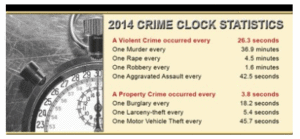As a Loss Prevention Manager for nearly 14 years, I was involved with training employees on robbery response. It is an unfortunate fact that store robberies do happen and it can be difficult to prevent them. We can do little to influence the choice of someone who wants to commit the crime other than to make a business an uninviting target. Public View monitors and signage indicating closed circuit television is in use can be deterrents to robbery; however a determined criminal may still choose to try to commit the crime. It is our responsibility to prepare employees on steps they can take to prevent a robbery and how to react and recover should a robbery take place.
It is important that employees are taught:
- To make eye contact with and greet customers. Criminals don’t want undo attention.
- If robbed, don’t panic. It is easier said than done but, panic makes it more difficult to comply with the robber’s demands and can make him/her more nervous.
- Do whatever the robber demands. Give them what they want and get them out of the store.
- During the event, pay attention to as many details as possible about the robber; what were they wearing? How tall are they? What color is their hair? Did they have an accent? Could you tell an approximate age of the subject?
- If possible, watch the direction of travel when the robber leaves the store. Did they go to the right or left? Was there a vehicle waiting for them? NEVER try to follow the robber outside. Whatever you see should be done from inside the store.
- Don’t touch ANYTHING once the robber leaves. This includes the cash register, the checkout counter, doors and anything else the robber may have touched.
There are also tips for managers and supervisors following a robbery:
- Call 911 and report the robbery and provide any information they ask. Stay calm. The dispatcher will have specific questions to ask and needs clear responses.
- If you have a supervisor or supervisors to assist, ask witnesses to stay to speak to the police and separate them from other people and each other. Information sharing tends to change a person’s perception of events. If possible, provide pens and paper and ask them to write down their recollection of events.
- The building is now a crime scene and needs to be secure. If you have rope, chairs, wet floor signs, use them to block off areas where the robber was believed to have been. Locking doors is discouraged since customers may want to leave. You also don’t want to touch areas on the door where the suspect may have touched. Prop a door open, pushing it from the bottom of the door (an unlikely place for a suspect to touch) and use it for entry and exit. Have someone stay at the door to turn away new customers and ensure no one touches the doors. This person will also direct police to a manager when they arrive.
- You can’t force people to stay, but you can ask them to stay to talk to police. If they are reluctant, ask if they will leave their name and contact information for police follow-up.
- Be prepared and have a counseling service number in your emergency contacts. Employees and customers may experience trauma and need to talk to a professional who can help them recover from the event.
- If you have video recording in your store, let the recorders run. Do not try to stop them or playback and review until the police ask for access to the recordings. Usually a Crime Scene Investigator will have the ability to retrieve the videos stored on a recorder or computer. If they need your assistance they will ask for it.
Recovery and getting back to “Business as Usual” is the final step. It is important to restore a sense of normalcy as soon as possible. Owners and managers must be sensitive to the needs of their employees. Everyone will have a different reaction to a traumatic situation. Be patient and allow for people to take some time off if necessary. There will be those employees who are ready to get back to work. For them it is their way of handling stress, so let them work. You may also have employees who were not working so they will not be affected in the same way as those who were present at the time. Rely on them to get the store back in business.
Have a robbery plan and review it regularly with employees. Being prepared will help you get through a crisis and back on your feet quickly.


Speak Your Mind
You must be logged in to post a comment.